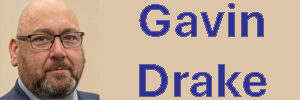Ephraim Hardcastle and the last British Archbishop of Canterbury

“I’m not a Pope” – the Archbishop of Canterbury Justin Welby, addresses journalists during a press conference at the conclusion of the Anglican Primates’ Meeting in Canterbury Cathedral last week.
© 2016 Gavin Drake
There is a rule in journalism that the answer to any question asked in a headline is always “no”. You would do well to bear this in mind when reading the Ephraim Hardcastle column in today’s Daily Mail, under the headline, “Might Justin Welby be the last British Archbishop of Canterbury?”
Well, it is of course, perfectly possible. Who knows who will be appointed to the role after Justin Welby steps down. And, after all, the last Archbishop of Canterbury, Rowan Williams, was himself a foreigner. The Church of England is not a British church but an English one – the clue is in the name. And Archbishop Rowan was appointed to the role from the neighbouring Church in Wales.
Okay, so Rowan William is British, but he was appointed to lead the Church of England from a sister church in the Anglican Communion.
Hardcastle says that “Some overseas bishops are pressing for their next leader to reflect the diverse nature of the worldwide church.” That sentence is about the only part of the article that has a ring of truth to it. But it isn’t accurate and it isn’t news (I reported on it in April 2012 for BBC Radio Four’s Sunday programme).
It isn’t accurate for two reasons: Firstly, how are you defining the word “leader”. As Justin Welby said several times at a press conference at the end of last week’s Primates Meeting, he isn’t a Pope; and secondly, what has been suggested isn’t a Communion-wide election for the next Archbishop of Canterbury; but an election by the Primates from amongst themselves of somebody to serve as their chair.
Hardcastle goes on to say: “My source says: ‘The next archbishop could come from another part of the world. Instead of being selected by a clandestine secret committee of the Church of England, he could be elected by all Anglican bishops.’”
This sentence completely misrepresents and misunderstands the ecclesiology of Anglican churches and shows that Hardcastle and his source has no understanding of Anglican ecclesiology. All Anglican national and transnational churches (the Provinces) are independent and autonomous bodies; and one Church doesn’t intervene in the affairs of another Church. That said, the Provinces are interdependent and what happens in one impacts on the others. So there are numerous transnational bodies, networks, commissions, committees, and so on.
But the idea that the leader of one Province should be decided by people from another Province is a non-starter. There just won’t be enough support from within the Anglican Communion for this level of inter-provincial “interference.”
And the current system can hardly be described as “a clandestine secret committee.” The Crown Nominations Commission sits in private and its deliberations are secret; but it is hardly clandestine – it is established by statute and its members are known. And these days, they even tell people when they are meeting.
As I said earlier, what has been suggested is not that the Archbishop of Canterbury should be elected by bishops of the Communion; but that the chair of the Primates Meeting should be elected from amongst the Primates. This would be a departure from previous practice and may impact on the primus inter pares role of the Archbishop of Canterbury.
Whether or not there is sufficient support for such a move is yet to be seen. But even if it was adopted, it would not make the elected Primates’ Chair the Archbishop of Canterbury. They would continue to be the Archbishop of whichever Province they were from; and the Archbishop of Canterbury would continue to be appointed under the rules and procedures laid down in English law.
Hardcastle concludes his short piece by quoting his source as saying: “There is a working precedent. Although the Pope is Bishop of Rome, Italians don’t always have one of their own as Pope. The last three have been a Pole, a German and an Argentinian.”
And this merely proves my earlier point that neither Hardcastle nor his source understands Anglican ecclesiology.
The Roman Catholic Church is just that – a Church. And the Bishop of Rome is the leader of the Church in all its territories.
In contrast, the Anglican Communion is 38 separate churches. And the Archbishop of Canterbury is leader of the Church of England. And even here, he shares his primatial authority with the Archbishop of York and has very little – if any – legal authority to intervene in the affairs of any diocese other than Canterbury. He certainly has no power to intervene in the affairs of the other 37 provinces.
As Justin Welby said at last week’s press conference: “I am not a Pope.”

